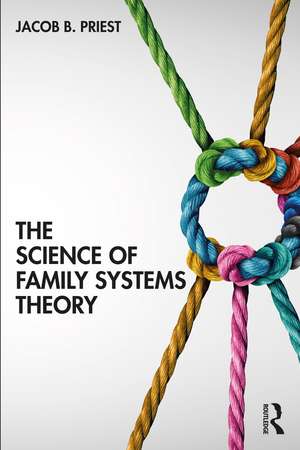The Science of Family Systems Theory
Autor Jacob Priesten Limba Engleză Paperback – 31 mar 2021
Uniquely focussing on how to integrate science as well as theory into clinical practice, the book provides an overview of science from multiple domains and ties it to family systems theory through the key framework of autonomy and adaptation. Drawing on research from genetics, physiology, emotion regulation, attachment, and triangulation, chapters demonstrate how a comprehensive science-informed theory of family systems can be applied to a range of problematic family patterns. The text also explores self-of-the-therapist work and considers how autonomy and attachment are connected to systems of power, privilege, and oppression.
Supported throughout by practical case examples, as well as questions for consideration, chapter summaries, and resource lists to further engage the reader, The Science of Family Systems Theory is an essential textbook for marriage and family therapy students as well as mental health professionals working with families.
| Toate formatele și edițiile | Preț | Express |
|---|---|---|
| Paperback (1) | 286.79 lei 3-5 săpt. | +14.58 lei 6-12 zile |
| Taylor & Francis – 31 mar 2021 | 286.79 lei 3-5 săpt. | +14.58 lei 6-12 zile |
| Hardback (1) | 813.45 lei 6-8 săpt. | |
| Taylor & Francis – 31 mar 2021 | 813.45 lei 6-8 săpt. |
Preț: 286.79 lei
Preț vechi: 301.89 lei
-5% Nou
Puncte Express: 430
Preț estimativ în valută:
54.88€ • 59.85$ • 46.27£
54.88€ • 59.85$ • 46.27£
Carte disponibilă
Livrare economică 03-17 aprilie
Livrare express 19-25 martie pentru 24.57 lei
Preluare comenzi: 021 569.72.76
Specificații
ISBN-13: 9780367427184
ISBN-10: 0367427184
Pagini: 190
Dimensiuni: 152 x 229 x 6 mm
Greutate: 0.26 kg
Ediția:1
Editura: Taylor & Francis
Colecția Routledge
Locul publicării:Oxford, United Kingdom
ISBN-10: 0367427184
Pagini: 190
Dimensiuni: 152 x 229 x 6 mm
Greutate: 0.26 kg
Ediția:1
Editura: Taylor & Francis
Colecția Routledge
Locul publicării:Oxford, United Kingdom
Public țintă
Postgraduate and ProfessionalCuprins
1. An Introduction to Family Systems Theory Part I. The Evidence of Autonomy and Adaptation 2. The Genetic and Individual Systems 3. The Attachment, Triangulation, and Family Systems 4. The Sociocultural System Part II. Linking the Evidence to Theory 5. The Family as an Autonomous System 6. The Family as an Adaptable System 7. Family Systems Theory Revisited Part III. Linking Theory to Practice 8. The Postmodern Critique and Family Systems Theory 9. Attachment Theory and Family Systems Theory 10. Trauma in Family Systems Theory 11. Family Systems Theory and Family Therapy Models 12. Conclusions and Invitations
Notă biografică
Jacob B. Priest is an associate professor in the couple and family therapy program at the University of Iowa. He received a PhD from Florida State University and has a private practice at the Counseling Center of Iowa City.
Recenzii
"This book is balanced and captivating. It guides the reader through a clear, comprehensive, and grounded review of the knowledge and practices in the area of family systems. A great resource for family researchers, educators, and clinicians seeking to advance their work." – Sesen Negash, PhD, LMFT, associate professor and director, Marriage and Family Therapy Program, San Diego State University
"In The Science of Family Systems Theory, Dr. Priest provides a cohesive guide to understanding and applying general systems theory with increased clarity and purpose. From describing the minute details of cells and DNA within the body to explaining systemic oppression in broader sociocultural systems, the author provides the reader with an opportunity to see how comprehensive general systems theory can be in explaining so many processes in the universe. The book also provides examples of how to make clear connections between scientific observations and family systems theory." – Daniel Hubler, PhD, CFLE, associate professor, Child and Family Studies, Weber State University
"In The Science of Family Systems Theory, Dr. Priest provides a cohesive guide to understanding and applying general systems theory with increased clarity and purpose. From describing the minute details of cells and DNA within the body to explaining systemic oppression in broader sociocultural systems, the author provides the reader with an opportunity to see how comprehensive general systems theory can be in explaining so many processes in the universe. The book also provides examples of how to make clear connections between scientific observations and family systems theory." – Daniel Hubler, PhD, CFLE, associate professor, Child and Family Studies, Weber State University
Descriere
This accessible text examines how the science of autonomy and adaptation inform all family therapy approaches and discusses how clinicians can use this science to improve their practice.
